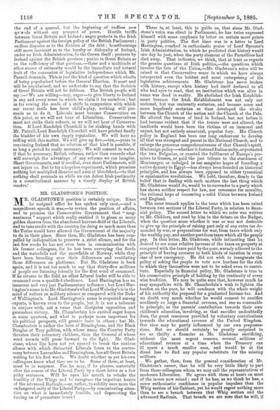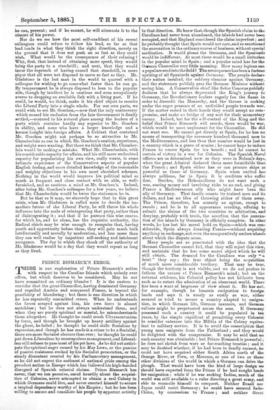MR. GLADSTONE'S POSITION.
MR. GLADSTONE'S position is certainly unique. Since he resigned office he has spoken only once,—and a magnificent speech it was,—to review the position of affairs, and to promise the Conservative Government that " mag- nanimous " support which really enabled it to glean so many golden sheaves from the abandoned harvest-field of the Liberals, and to take credit with the country for doing so much more than the Tories would have allowed the Government of the majority to do in their place. Since then, Mr. Gladstone has been com- pelled by indisposition to preserve a strict silence, and for the last few weeks he has not even been in communication with his former colleagues, for he has been surveying the fiords and the waterfalls and the snowfields of Norway, while they have been brooding over their differences and ventilating those differences on platforms. But Mr. Gladstone is back again, and it is not too much to say that thirty-five millions of people are listening intently for the first word of command. If he returns to the field, no other Liberal leader will be able to command even a qualified obedience. Lord Harlington has an immense and very just Parliamentary influence ; but Lord Har- tington's name is to Mr. Gladstone's what Lord Wolseley's is in the mind of writers on military science as compared with the Duke of Wellington's. Lord Hartington's name is respected among experts, is known even to the people, but it is not a talisman to conjure with, not a name that dissipates opposition and guarantees victory. Mr. Chamberlain has excited eager hopes in some quarters, and what is perhaps more important for his political prospects, still greater fears in others ; but Mr. Chamberlain is rather the hero of Birmingham, and the Black Douglas of Tory politics, with whose name the Country Party threaten their refractory children, than the General at whose word crowds will press forward to the fight. Mr. Glad- stone, whose lips have not yet opened to break the anxious silence with which distracted Liberals listen to the contro- versy between Lancashire and Birmingham, has all Great Britain waiting for his first words. We doubt whether as yet his own colleagues know what they are to be. Some of them, at least, must be in suspense. For he may, if he pleases, materially alter the course of the Liberal Party by a short letter or a few pithy sentences. Will he open his month to rebuke the timidity of the Whigs and to enrapture the impatient hearts of the advanced Radicals,—or, rather, to solidify once more the endangered unity of the Liberal Party,—by concentrating atten- tion on what is immediately feasible, and deprecating the forcing on of premature issues ? There is, at least, this to guide us, that since Mr. Glad- stone's voice was silent in Parliament, he has twice expressed himself with some emphasis by letter on certain moot points in party politics. The first time was in a letter to Lord Harlington, couched in enthusiastic praise of Lord Spencer's Irish Administration, to which he predicted that history would one day be just, when the party clamour of the Parnellites had died away. That indicates, we think, that at least as regards the greater questions of Irish politics,—the questions which involve the fate of the Union,—Mr. Gladstone's voice will be raised in that Conservative sense in which we have always interpreted even the boldest and most enterprising of his legislative achievements. Mr. Gladstone has never broken with history, except when history had itself declared to all who had eyes to read, that an institution which was alive in name was dead in reality. He abolished the Irish Establish- ment because the Irish Establishment was not only not national, but was eminently sectarian, and became more and more hopelessly sectarian as time developed the rivalry between the Church of the nation and the Church of the Pale. He altered the tenure of land in Ireland, but not before it had become evident that if the tenure were not altered, the landlords would have been the victims of an immoral and unjust, but not entirely unnatural, popular fury. His Church policy in England has been one long endeavour to develop all that was strongest and purest in the National Church, and to enlarge the generous comprehensiveness of that Church's spirit. His foreign policy—whether it fostered Italian unity, or protected the two Bulgarias, or exacted the fulfilment of Europe's pro- mises to Greece, or paid the just tribute to the sturdiness of Montenegro, or indulged in too sanguine hopes of founding a native dynasty in Egypt—has always been founded on historical principles, and has always been opposed to either tyrannical or opinionative revolutions. We hold, therefore, firmly to the belief that in dealing with such matters the last thing which Mr. Gladstone would do, would be to surrender to a party which has shown neither respect for law, nor reverence for morality, the rational hope of cementing a solid Union between Ireland and England.
The same remark applies to the issue which has been raised between two sections of the Liberal Party, in relation to finan- cial policy. The second letter to which we refer was written to Mr. Childers, and read by him in the debate on the Budget, when the question arose whether it was or was not desirable to give up the principle of raising part only of any extra tax de- manded by war, or preparations for war, from taxes which only the wealthy pay, and another part from taxes which all the people pay. In that letter, Mr. Gladstone, while intimating that he desired to see some relative increase of the taxes on property as compared with the taxes paid by the poor, warmly adhered to the principle of having recourse to both kinds of taxation in every case of new emergency. He did not wish to inaugurate the policy of asking the people to vote new burdens for the rich to which they themselves were not to be asked even to contri- bute. Especially in financial policy, Mr. Gladstone is true to his conservative principle of holding by the continuity of every wise tradition. We may be quite sure that, however much he may sympathise with Mr. Chamberlain's wish to lighten the burden on the poor, he will condemn with the whole weight of his authority the proposal for a graduated Income-tax. And we doubt very much whether he would consent to sacrifice needlessly so large a financial revenue, and one so reasonable in principle, as the parents' contribution towards their own children's education, involving, as that sacrifice undoubtedly does, the great resources provided by voluntary contributions towards the educational revenue of the United Kingdom. Our view may be partly influenced by our own preposses- sions. But we should certainly be greatly surprised to see so thrifty a financier as Mr. Gladstone sacrificing, without the most urgent reasons, several millions of educational revenue at a time when the Treasury can ill spare a mach smaller sum, and would be at the direst loss to find any popular substitute for the missing millions.
We gather, then, from the general consideration of Mr. Gladstone's career, that he will be very little likely to part from those colleagues whom we may call the representatives of moderate Liberalism. He agrees with them at heart on most of the issues now raised ; and if he has, as we think he has, a more enthusiastic confidence in popular impulses than the Whig section of his Cabinet, yet he would regret nothing more than to see a breach between that Whig section and the advanced Radicals. That breach we are sure that he will, if he can, prevent ; and if he cannot, he will attenuate it to the utmost of his power.
Nor do we see how the most self-confident of his recent colleagues could refuse to follow his lead, so far as that lead tends in what they think the right direction, merely on the ground that it does not push on as fast as they could wish. What would be the consequence of their refusing ? Why, first, that instead of obtaining more speed, they would bring the party to a standstill ; and next, that they would incur the reproach of having caused that standstill, in mere pique that all were not disposed to move so fast as they. Mr. Gladstone is the last man in the world to quarrel with a colleague for wishing to go somewhat faster than he can go. By temperament he is always disposed to lean to the popular side, though by intellect he is cautious and even scrupulously averse to dropping an available link with a living past. If he could, he would, we think, make it his chief object to reunite the Liberal Party into a single whole. For our own parts, we could wish to see Mr. Goschen,—now that the only controversy which caused his exclusion from the late Government is finally settled,—restored to his natural place among the leaders of a party which contains hardly any superior to Mr. Goschen in ability, and none who have a larger knowledge and a keener insight into foreign affairs. A Cabinet that contained Mr. Goschen might not perhaps be so attractive to Mr. Chamberlain as one in which Mr. Goschen's caution, experience, and weight were wanting. But there we think that Mr. Chamber- lain would be making a mistake. What Mr. Chamberlain, with his considerable capacity for affairs, and his still more undoubted capacity for popularising his own view, really wants, is some intimate experience of the Conservative aspects of popular English feeling, and more detailed knowledge of the reasonable and weighty objections to his own most cherished schemes. Nothing in the world would improve his political mind so much as frequent and close contact with so able, so well- furnished, and so cautions a mind as Mr. Goschen's. Indeed, after being Mr. Goschen's colleague for a few years, we believe that Mr. Chamberlain would be twice the statesman he is.
But be that as it may, we sincerely hope that in this great crisis, when Mr. Gladstone is called upon to decide the im- mediate future of bhe Liberal Party, he will throw his whole influence into the scale of reintegrating that party, rather than of disintegrating it ; and that if he pursues this wise course, for which he, and he alone, has the requisite authority, the Radical chiefs may be wise enough to recognise that, having youth and opportunity before them, they will gain mach both intellectually and morally by moderation, and lose more than they can well realise by impatient self-seeking and intolerant arrogance. The day in which they shook off the authority of Mr. Gladstone would be a day that they would repent as long as they lived.



































 Previous page
Previous page